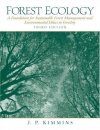![Forest Ecology Forest Ecology]()
Click to have a closer look
About this book
Contents
Biography
Related titles
About this book
This textbook, appropriate for undergraduate courses in both forest ecology or those covering forest ecosystems and their classification, uses the ecosystem approach to understand the ecology of forests, examining the form and function of forests and how they change over time in response to natural and human-induced disturbances.
Contents
I. PEOPLE AND FORESTS: WHY THE SCIENCE OF FOREST ECOLOGY DEVELOPED. 1. Sustainability of Forest Ecosystems: The Problem of Human Population Growth. 2. Development of Forestry and Forest Ecology. II. ECOSYSTEM AS THE BASIC UNIT OF FOREST ECOLOGY. 3. Ecology and the Ecosystem Concept. 4. Production Ecology: The Transfer and Storage of Energy in Ecosystems. 5. Biogeochemistry: Cycling of Nutrients in Ecosystems. III. ECOLOGICAL DIVERSITY AND THE ECOLOGICAL STAGE: PHYSICAL DETERMINANTS OF THE ECOLOGICAL PLAY. 6. Ecosystem Classification: The Ecological Foundation for Sustainable Forest Management. 7. Ecological Role of Solar Radiation. 8. Temperature as an Ecological Factor. 9. Wind: Ecological Effects of Atmospheric Movements. 10. Water: The Material that Makes Life Possible. 11. Soil: The Least Renewable Physical Component of the Ecosystem. 12. Fire: A Pervasive and Powerful Environmental Factor. 13. Patterns of Biotic Communities along Environmental Gradients. IV. BIOLOGICAL DIVERSITY: POPULATION, COMMUNITY, AND GENETIC DETERMINANTS OF THE ECOLOGICAL PLAY. 14. Population Ecology: Study of the Abundance and Dynamics of Species Populations. 15. Community Ecology. 16. Genetic and Evolutionary Aspects of Ecosystems: Adaptation and Evolution.1 V. TEMPORAL DIVERSITY: THE ECOLOGICAL PLAY IN WHICH ALL ASPECTS OF ECOSYSTEMS CHANGE OVER TIME. 17. Ecological Succession: Processes of Change in Ecosystems.1 18. Understanding and Emulating Natural Forest Disturbance: A Template for the Management of Succession and Temporal Diversity? VI. SPATIAL DIVERSITY: THE LANDSCAPE REVISITED. 19. Ecosystem Management and Landscape Ecology - The Ultimate Focus in Forest Ecology. 20. Environmental Issues in Forestry: The Role of Ecology in the Management of the Ecological Play. VII. APPLICATION OF ECOLOGICAL KNOWLEDGE IN THE MANAGEMENT OF FOREST ECOSYSTEMS. 21. Models and Their Role in Ecology and Resource Management.1 22. Sustainability and Renewability of Natural Resources, and Implications for Forest Management. 23. Concluding Statement.
Customer Reviews
Biography
James Peter Kimmins Following an undergraduate degree in Forestry from the University of Wales and an M.Sc. in Forest Entomology from the University of California at Berkeley, James Peter Kimmins, generally known as Hamish, received his PhD in Forest Ecology at Yale University, focusing on the relationship between ecosystem function and herbivore population dynamics. Since 1969 he has been a Professor of Forest Ecology at the University of British Columbia, where he has presented courses on forest ecology, ecosystem classification, ecological aspects of silviculture, environmental issues in forestry, ecosystem function and response to disturbance, and modeling forest ecosystems to undergraduates, graduate students and professional foresters. He has developed and currently tutors a UBC web-based Distance Education course in Forest Ecology. The fifty-three graduate students he has supervised over the past thirty-five years have studied nearly all aspects of forest ecology from ecophysiology to nutrient cycling and production ecology, to succession, landscape ecology and modeling. For the past twenty-six years, Dr. Kimmins has worked to develop ecologically-based forest ecosystem management models, from the spatially-explicit, individual tree stand model FORCEE, to the a-spatial stand model FORECAST, to the spatial, local landscape, complex disturbance patch model LLEMS, and the spatial watershed ecosystem management model POSSIBLE FOREST FUTURES. These models range from a high school education forest management game (FORTOON), to decision support and research tools, to scenario analysis and value tradeoff assessment tools. He is currently a Senior Canada Research Chair in Modeling the Sustainability of Forest Ecosystems, and is Director of the Forest Ecosystem Management Modeling Group in the Department of Forest Sciences. Dr. Kimmins is a member of UNESCO's World Commission on the Ethics of Science and Technology (COMEST). and serves on many science advisory boards.




























